|
|
|
Sort Order |
|
|
|
Items / Page
|
|
|
|
|
|
|
| Srl | Item |
| 1 |
ID:
099638


|
|
|
|
|
| Publication |
2010.
|
| Summary/Abstract |
Three main factors explain public support for EU membership: utilitarian expectations, the role of values and ideas, and class partisanship. In the Polish case, public opinion polls and issues more specific to Poland, such as the role of the Catholic Church, populist political parties and profound Euroscepticism among farmers, suggest that although these theoretical explanations overlap, each of them has a different explanatory value. The economic approach remains the best predictor of support for EU membership, and whereas values and identity are closely linked to and dependent upon economic expectations, the impact of national politics appears largely decoupled from Polish Euroscepticism.
|
|
|
|
|
|
|
|
|
|
|
|
|
|
|
|
| 2 |
ID:
159283
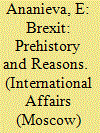

|
|
|
|
|
| Summary/Abstract |
Bargaining is a repulsive habit; compromise is one of the highest human virtues.
|
|
|
|
|
|
|
|
|
|
|
|
|
|
|
|
| 3 |
ID:
149458
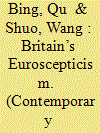

|
|
|
|
|
| Summary/Abstract |
Britain has voted to leave the European Union by 51.9% to 48.1% in June 2016. David Cameron announced his resignation following the vote for Brexit. Euroscepticism in the British public has been rising and political debates over how to handle Britain’s Relationship with the EU have also been intensifying. The numbers wanting a Brexit had been growing. With the EU trapped in a quagmire made of multiple crises, Britain’s referendum would be the same as rubbing salt into the wounds. A Brexit would not affect just Britain and the EU but it would have an effect on the entire world. Why did Britain opt out when it already enjoys a preferential status in the EU—it is outside the Eurozone and Schengen area? Why did the British public vote for Brexit when it was obvious that it would cause more harm than good? What was the underlying logic? This essay searches for the roots of Britain’s Eurosceptism by tracing back to post-World War II Britain-European relations and attempts to anticipate the possible impacts of the Brexit referendum.
|
|
|
|
|
|
|
|
|
|
|
|
|
|
|
|
| 4 |
ID:
145470
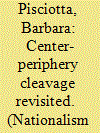

|
|
|
|
|
| Summary/Abstract |
The article examines the evolution of Eastern and Central European party systems from the previous communist/anticommunist conflict to the emergent division between pro-EU and Eurosceptic forces and puts forward a revised view of the traditional center-periphery cleavage in six countries: Poland, Hungary, the Czech Republic, Slovakia, Bulgaria, and Romania. The first part addresses the question of “stateness” and the second the Rokkan spatial approach while the third develops a revised view of the center-periphery cleavage in relation to space at the national (minority ethnic groups vs. state), regional (EU vs. Eastern European member states), and global (USSR vs. satellite countries during the bipolar system) levels.
|
|
|
|
|
|
|
|
|
|
|
|
|
|
|
|
| 5 |
ID:
129963


|
|
|
|
|
| Publication |
2014.
|
| Summary/Abstract |
Italy is one the most europhile countries in the European Union. Nevertheless, as surveys show, over the last few years anti-European sentiments have increasingly surfaced among Italian citizens. Furthermore, there is now an important novelty regarding the relation between Italy and Europe: the Movimento 5 Stelle (The Five Star Movement), a new party that expresses a peculiar and contradictory position towards Europe. Its leader, Beppe Grillo, sometimes advocates more, not less, unification, but he also proposes a referendum on Italian membership of the euro. Moreover, Grillo's blog frequently lends its voice to the choir of openly anti-European sentiment. Indeed, Grillo's call for direct democracy is plebiscitarian and his positions contribute to the weakening of a European project that is already facing grave difficulties of its own.
|
|
|
|
|
|
|
|
|
|
|
|
|
|
|
|
| 6 |
ID:
145556


|
|
|
|
|
| Summary/Abstract |
In the 1975 referendum England provided the strongest support for European integration, with a much smaller margin for membership in Scotland and Northern Ireland. By 2015 the rank order of ‘national’ attitudes to European integration had reversed. Now, England is the UK's most eurosceptic nation and may vote ‘Leave’, while Scotland seems set to generate a clear margin for ‘Remain’. The UK as a whole is a Brexit marginal. To understand the campaign, we need to make sense of the dynamics of public attitudes in each nation. We take an ‘archaeological’ approach to a limited evidence-base, to trace the development of attitudes to Europe in England since 1975. We find evidence of a link between English nationalism and euroscepticism. Whatever the result in 2016, contrasting outcomes in England and Scotland will exacerbate tensions in the UK's territorial constitution and could lead to the break-up of Britain.
|
|
|
|
|
|
|
|
|
|
|
|
|
|
|
|
| 7 |
ID:
172508
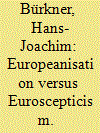

|
|
|
|
|
| Summary/Abstract |
Several overlapping crises which affected the EU during the past ten years have recently aggravated. Especially the progressing refugee crisis, the persisting financial crisis and geopolitical turmoil in the EU’s neighbourhood contributed to the rise of anti-EU movements and diverse articulations of Euroscepticism. Although public opinion and mainstream political analysis have easily identified right-wing populism as one of the most important drivers, it is still doubtful if it can be equated with Euroscepticism without further ado. To date it is by no means clear how and where Euroscepticism exactly originates.
|
|
|
|
|
|
|
|
|
|
|
|
|
|
|
|
| 8 |
ID:
071468
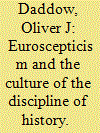

|
|
|
|
|
| Publication |
2006.
|
| Summary/Abstract |
This article explores the uses of history in contemporary Eurosceptic discourse in Britain. It does so in the knowledge that studying an essentially contested concept such as Euroscepticism poses severe methodological problems, and in the first section I situate my article in the emerging scholarly literature on the subject. Having explained why I limit my research to popular Euroscepticism in the tabloid press, in the second section I critically analyse the rhetorical strategies employed by the Sun and the Daily Mail to garner support for their line on Europe, suggesting that the appeal of their discourse resides in its recourse to national history of the school textbook variety. In the third part I use this finding to argue that the discipline of history has been an unwitting accomplice in making Euroscepticism so popular amongst the British public, press and politicians. This has considerable ramifications both for the theoretical study of Euroscepticism and the political efforts to counter its popularity, and I consider all of these in the conclusion.
|
|
|
|
|
|
|
|
|
|
|
|
|
|
|
|
| 9 |
ID:
164546
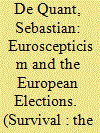

|
|
|
|
|
| Summary/Abstract |
A larger eurosceptic bloc could emerge that exploits divisions in the pro-EU camp and creates gridlock.
|
|
|
|
|
|
|
|
|
|
|
|
|
|
|
|
| 10 |
ID:
169454
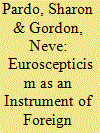

|
|
|
|
|
| Summary/Abstract |
This article advances three arguments about Euroscepticism. First, using Israel as a case study we describe its alliances with Eurosceptic political actors, claiming that while each side hopes to benefit from these alliances to advance particular interests, the attraction among the actors are based on ideological affinities that do not align with the norms informing EU policies. If these norms become more contested, it may make it more difficult to construct a ‘normative power’-based approach in EU foreign policy. Second, we reveal how third parties can use Euroscepticism as an instrument for shaping EU foreign policy. Finally, we expose how this strategy produces a political paradox. By allowing itself to become an instrument deployed by a third party, the Eurosceptic member state also agrees to be pushed back into the fold of the EU apparatus, thus reconstituting itself as an internal actor, one which has stakes in the process and is willing to play by the rules of the game.
|
|
|
|
|
|
|
|
|
|
|
|
|
|
|
|
| 11 |
ID:
152539
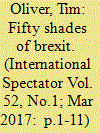

|
|
|
|
|
| Summary/Abstract |
Britain’s vote to leave the EU has raised more questions than answers, which is ironic given that David Cameron’s aim for the referendum was to settle the European question in British politics. The outcome, which reflected a range of causes, leaves significant uncertainties overhanging UK politics, UK-EU relations and wider European politics. It is likely that the confused outcome of the referendum and the technicalities of Brexit mean that for both the UK and the EU future relations will resemble fifty shades of grey rather than some black and white division of in or out.
|
|
|
|
|
|
|
|
|
|
|
|
|
|
|
|
| 12 |
ID:
141199
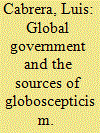

|
|
|
|
|
| Summary/Abstract |
While a number of prominent researchers have recently turned their attention to the likelihood or desirability of full world government, such an ideal has little current support in civic and popular discourse. This article seeks to identify some factors possibly reinforcing such ‘globoscepticism’. After first discussing why it should not be seen as prima facie absurd to support global political integration, and noting widespread popular support in the immediate aftermath of the Second World War, it turns to some findings on the sources of Euroscepticism. This phenomenon involves negative attitudes expressed by political elites and ordinary citizens towards European Union integration. Also considered are the determinants of attitudes towards international trade liberalisation. Insights from both areas can be applied to a preliminary exploration of globoscepticism. Specifically, they can enrich an analysis of domestic biases which naturally arise and are reinforced within a sovereign states system, and which tend to diminish support for comprehensive projects beyond the state. These pose challenges that must be addressed by academic advocates of full global integration, as well as advocates of still-ambitious but far less comprehensive projects of suprastate institution building.
|
|
|
|
|
|
|
|
|
|
|
|
|
|
|
|
| 13 |
ID:
141764
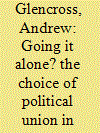

|
|
|
|
|
| Summary/Abstract |
This article explores the inter-related debates over Britain's relationship with the EU and that over the future of the UK. It argues that euroscepticism and Scottish independence are based on exceptionalist identities that now revolve around economic policy. Elite euroscepticism cleaves to a neoliberal vision of minimalist regulation, while advocates of Scottish independence claim Westminster's austerity policies make the British Union incompatible with social democracy. However, this presentation of the choice facing British voters ignores the serious contradictions that overhauling the current order entails. Both forms of exceptionalism fail to recognize the significant limitations of self-government outside and within the EU. If Conservatives can contain their neoliberal flirtation with EU withdrawal they are very well placed to prosper electorally. The dilemma of which union(s) to choose might thus constitute the prelude to the entrenchment of the economic and political order that gave rise to such contestation in the first place.
|
|
|
|
|
|
|
|
|
|
|
|
|
|
|
|
| 14 |
ID:
172514
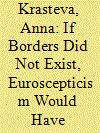

|
|
|
|
|
| Summary/Abstract |
The thesis of this article is that if borders did not exist, Euroscepticism would have invented them. If Sartre is paraphrased, it is to emphasize that Euroscepticism needs borders in the same intense political and symbolic way as anti-Semitism needs Jews. This thesis is argued in three steps. The first analyses the paradox of the intense theoretical deconstruction of borders in the era of an overbordered world and argues the ideas of the ‘revenge of the state’ and of the emergence of the ‘neo-post-Westphalian order’. The second part examines the post-communist Europeanisation as de-bordering and distinguishes three forms: Europeanisation through utopianization, Europeanisation through ethnic de-bordering and Europeanisation through de-territorialization. The third part analyses the interferences and intensification of re-bordering and Euroscepticism. The stato-national and the ethno-identitarian bordering practices are analysed through the images of wall and body. Two types of Euroscepticism – extremist and crypto – are distinguished and compared.
|
|
|
|
|
|
|
|
|
|
|
|
|
|
|
|
| 15 |
ID:
106944
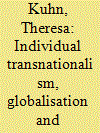

|
|
|
|
|
| Publication |
2011.
|
| Summary/Abstract |
Recent trends of mass-level euroscepticism seriously challenge Deutsch's transactionalist theory that increased transnational interactions trigger support for further political integration. While transnational interactions have indeed proliferated, public support for European integration has diminished. This article aims to solve this puzzle by arguing that transnational interaction is highly stratified across society. Its impact on EU support therefore only applies to a small portion of the public. The rest of the population not only fails to be prompted to support the integration process, but may see it as a threat to their realm. This is even more the case as, parallel to European integration, global trends of integration create tensions in national societies. The following hypotheses are proposed: first, the more transnational an individual, the less she or he is prone to be eurosceptical; and second, this effect is more pronounced in countries that are more globalised. A multilevel ordinal logit analysis of survey data from the 2006 Eurobarometer wave 65.1 confirms these hypotheses.
|
|
|
|
|
|
|
|
|
|
|
|
|
|
|
|
| 16 |
ID:
126231
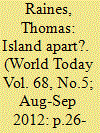

|
|
|
|
|
| Publication |
2012.
|
| Summary/Abstract |
Thomas Raines explains the democraphics of British Euroscepticism.
|
|
|
|
|
|
|
|
|
|
|
|
|
|
|
|
| 17 |
ID:
138276
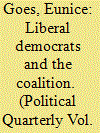

|
|
|
|
|
| Summary/Abstract |
When the Liberal Democrats joined the Coalition government in May 2010, there was an expectation that they would have a restraining effect on the Conservatives, particularly in the area of European politics. But after almost five years as the junior party in the Coalition, the Liberal Democrats struggle to demonstrate their influence over the government's approach to Europe. Not only did they let the Conservatives lead the Coalition's European agenda, but they will be forever associated with the government that brought the UK closer to the exit door of the European Union. The article argues that this outcome is the result of a series of avoidable if surprising mistakes, such as the choice of ministerial portfolios and the party's attitude to the Coalition's monitoring mechanisms, as well as some unavoidable mistakes that could have not been foreseen when the Coalition was formed.
|
|
|
|
|
|
|
|
|
|
|
|
|
|
|
|
| 18 |
ID:
098150
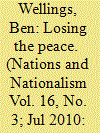

|
|
|
|
|
| Publication |
2010.
|
| Summary/Abstract |
Political resistance to European integration in the UK laid important ideological foundations for contemporary English nationalism. The politics surrounding accession to the European Economic Community (EEC) was such that it signalled that accession was a matter of supreme national importance and, via the device of a referendum, it led to the fusing of parliamentary and popular sovereignty. The unfolding of the Thatcherite project in Britain added an individualistic - and eventually an anti-European - dimension to this nascent English nationalism. Resistance to the deepening political and monetary integration of Europe, coupled with the effects of devolution in the UK, led to the emergence of a populist English nationalism, by now fundamentally shaped by opposition to European integration, albeit a nationalism that merged the defence of British and English sovereignty. Underpinning these three developments was a popular version of the past that saw 'Europe' as the ultimate institutional expression of British decline. Thus Euroscepeticism generated the ideology of contemporary English nationalism by legitimising the defence of parliamentary sovereignty through the invocation of popular sovereignty underpinned by reference to the past.
|
|
|
|
|
|
|
|
|
|
|
|
|
|
|
|
| 19 |
ID:
179381
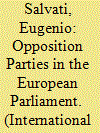

|
|
|
|
|
| Summary/Abstract |
The different crises which have affected the European Union (EU) since 2008, have triggered a major politicisation of European integration. This dynamic makes it of utmost importance to understand how parties act within the European Parliament (EP), in order to gauge whether it is possible to identify a parliamentary opposition which is Eurocritical but not Eurosceptic.
|
|
|
|
|
|
|
|
|
|
|
|
|
|
|
|
| 20 |
ID:
113139
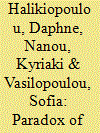

|
|
|
|
|
| Publication |
2012.
|
| Summary/Abstract |
What can explain the strong euroscepticism of radical parties of both the right and the left? This article argues that the answer lies in the paradoxical role of nationalism as a central element in both party families, motivating opposition towards European integration. Conventionally, the link between nationalism and euroscepticism is understood solely as a prerogative of radical right-wing parties, whereas radical left-wing euroscepticism is associated with opposition to the neoliberal character of the European Union. This article contests this view. It argues that nationalism cuts across party lines and constitutes the common denominator of both radical right-wing and radical left-wing euroscepticism. It adopts a mixed-methods approach, combining intensive case study analysis with quantitative analysis of party manifestos. First, it traces the link between nationalism and euroscepticism in Greece and France in order to demonstrate the internal validity of the argument. It then undertakes a cross-country statistical estimation to assess the external validity of the argument and its generalisability across Europe.
|
|
|
|
|
|
|
|
|
|
|
|
|
|
|
|
|
|
|
|
|